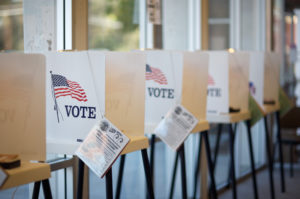
The U.S. Court of Appeals for the Eighth Circuit ruled that groups may not litigate on behalf of voters, EPA proposed a new rule to protect individuals from hazardous chemicals, and more…
IN THE NEWS
- The U.S. Court of Appeals for the Eighth Circuit ruled in a 2-1 decision that private citizens and civil rights groups do not have a right to bring litigation on behalf of voters under Section 2 of the Voting Rights Act. Section 2 prohibits voting practices that discriminate on the basis of race. By finding that no private right of action exists, the decision reserves the right to bring a Section 2 action for the government only.
- The U.S. Environmental Protection Agency (EPA) proposed a new rule that is designed to protect individuals from decaBDE and PIP 3:1, two chemicals known for persistent and toxic effects on the human body. DecaBDE and PIP 3:1 are used in wire and consumer goods, and both can harm reproductive and nervous system development with enough exposure. The proposed rule would mandate that workers who handle these chemicals use protective gear, and would phase-out the use of certain lubricants and greases.
- The U.S. Food and Drug Administration (FDA) approved medical device company Medtronic’s blood pressure treatment device despite a split vote from independent experts on the device’s effectiveness. Known as “Symplicity,” the device targets high blood pressure that does not respond to other medications or interventions including radiation near the kidneys. Although earlier versions of the device failed in clinical studies, FDA found that newer iterations from Medtronic are successful in reducing blood pressure. Symplicity is the second device of its kind to gain FDA approval.
- The U.S. Department of Treasury and the Internal Revenue Service released guidance clarifying the Investment Tax Credit, which is critical for companies planning clean energy projects. The guidance is intended to provide companies with clarity in making investment decisions for clean energy projects. The guidance updates a range of technical definitions and provides guidance on which clean energy infrastructure costs may be included in taxpayers’ tax bases. Deputy Secretary of the Treasury Wally Adeyemo said the guidance is “key to creating good-paying clean energy jobs and lowering Americans’ utility bills.”
- The Federal Communications Commission (FCC) proposed banning early termination fees for cable and satellite television services. FCC argues in justifying its proposal that the fees restrict customer choice and reduce competition. FCC chair Jessica Rosenworcel emphasized both the need to prevent customers from paying for unwanted services, and FCC’s responsibility to promote competitive media markets in the industry. The proposal also aligns with President Biden’s initiative to reduce “junk fees”—hidden charges that consumers may face beyond the standard cost of service.
- New Jersey Governor Phil Murphy released a new policy to guide the use of generative artificial intelligence by state employees. The guidance is intended both to help public workers use generative artificial intelligence tools appropriately and transparently and to ensure that outputs are fact-checked. New Jersey Chief Innovation Officer Beth Simone Noveck said that New Jersey “must invest in training public workers to use emerging technologies in a responsible, equitable, and secure manner.”
- Oklahoma Attorney General Gentner Drummond issued updated guidance to all Oklahoma law enforcement agencies clarifying that Oklahoma state law does not permit punishing women for seeking, performing, or self-inducing an abortion. Drummond explained in an official opinion that although abortion is still unlawful in Oklahoma, state officials should only pursue charges against those who intentionally perform or assist with an elective or on-demand abortion in Oklahoma.
WHAT WE’RE READING THIS WEEK
- In a recent Brookings Institution article, senior director Jonathan Katz, senior fellow Norman Eisen, senior fellow Nicol Turner Lee, and senior research analyst Colby Galliher, all with Brookings, highlighted artificial intelligence’s (AI) potential to enhance election efficiency by automating certain tasks, such as voter list management and ballot counting. Katz and his coauthors cautioned that AI could also worsen cybersecurity threats and the spread of misinformation. The authors recommended that policymakers enact proactive regulations to promote transparency in AI used in elections, guidelines to address the dissemination of misinformation to the public, and cybersecurity protocols to safeguard these tools.
- In a new paper, Michelle Benedetto Nietz, a professor at the University of San Francisco School of Law, and Katherine Stromin, a student at the University of San Francisco School of Law, argued that congressional inaction has forced judges to act as blockchain regulators through their judicial decisions. Nietz and Stromin cautioned that judges may lack the expert technical knowledge to regulate blockchain effectively. They concluded that Congress’s lack of action has created a piecemeal regulatory system that is both inefficient and stifling to innovation.
- In a new article published in the Emory Law Journal, David A. Simon, a postdoctoral Research Fellow at Harvard Law School’s Petrie-Flom Center for Health Law Policy, Biotechnology, and Bioethics, argued that the U.S. Food and Drug Administration should end its strict regulations limiting drug manufacturer’s speech about unapproved uses for a drug. In place of the current system—which bars almost all speech by manufacturers on unapproved uses—Simon proposed creating a sliding scale system where speech that is well-supported by evidence is subject to fewer restrictions, while less-supported statements are scrutinized more closely. Simon concluded that this approach could encourage doctors to become more informed about potential off-label uses.



